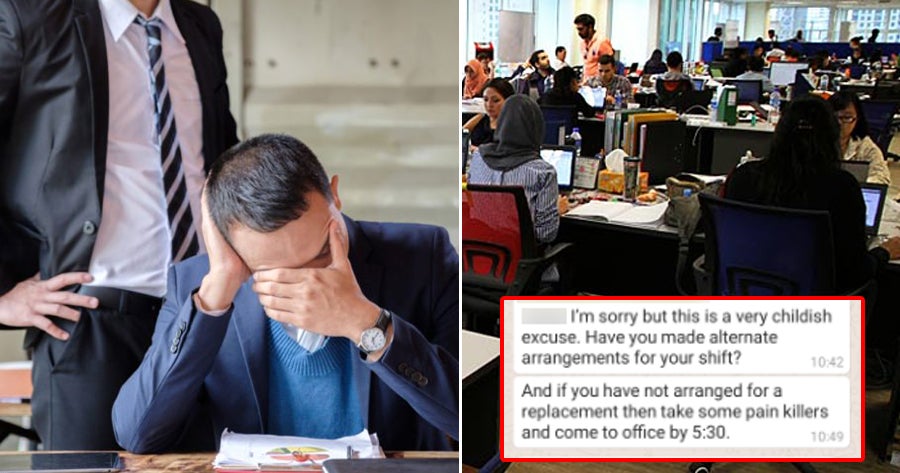When you fall under the weather and get clearance from your doctor to take sick leave, you are entitled to it provided you have a balance of paid sick leaves left.
According to the Employment Act 1955, every employee is entitled to a minimum of 14 days if the employee has been employed for less than two years; 18 days if the employee has been employed for two years or more but less than five years; and 22 days if the employee is employed for more than five years.
However, in a recent case at a company located in Kuala Lumpur, an employee received a rude remark from his boss who ordered him to come into work even after he had provided his medical certificate (MC).
Speaking to WORLD OF BUZZ, an employee from the company shared how his colleague, Iman (pseudonym) had informed the company on their group chat that he was having a toothache and would, therefore, be taking sick leave on 5 September.
He also provided a photo of his MC that he got from his doctor.

For illustration purpose
However, instead of allowing Iman to take the day off or at least speak to him privately about it, the boss deemed Iman’s reason for taking sick leave as “childish” and questioned whether Iman had made “alternate arrangements” for his shift. The boss then said if Iman had not made prior arrangements, he would have to still come into the office by 5.30pm.
“If you have not arranged for a replacement then take some pain killers and come to office by 5.30,” he said.

Screenshot of the chat that was shared to world of buzz.
When asked if Iman had still gone to work that day, his colleague said he did not. His colleague further added that it was stated on the MC that Iman had a fever, which could have been caused by a variety of issues related to his toothache.
Seeing that Iman was given such a response by his boss for taking sick leave due to a toothache and was ordered to come into the office, many of you may be wondering: Can bosses actually do that?
Well, according to Section 60F(2)(b) of the Employment Act 1955:
An employee who absents himself on sick leave,
- which is not certified by a registered medical practitioner
- which is certified by such registered medical practitioner but without
informing or attempting to inform his employer of such
sick leave within 48 hours of the commencement
thereof,
shall be deemed to absent himself from work without the permission of his employer and without reasonable excuse for the days on which he is so absent from work.
From the text that Iman sent to his boss, he had informed his boss and provided a legitimate MC within the time frame mentioned in the Employment Act 1955.
This means that Iman’s boss had no right to refuse Iman’s sick leave.

For illustration purpose
The Employment Act 1955 Section 100 (5) also states that there are penalties for employers who refuses an employee’s paid sick leave.
Any employer who fails to grant sick leave, or fails to pay sick leave pay, to any of his employees commits an offence.
The employer shall also, on conviction, be ordered by the court to pay to the employee the sick leave pay for every day of such sick leave at the rate provided under section 60F, and the amount so ordered by the court to be paid shall be recoverable as if it were a fine imposed by such court.
To put it simply, a sick leave is an employee’s entitlement and it should be stated in the contract when you get a job at a company. An employer can face action against him if he fails to grant an employee his or her sick leave.
In this case, Iman’s boss had failed to grant Iman his sick leave and has, therefore, committed an offence as stated by the Employment Act 1955.
What do you think of this issue? Let us know in the comments below.
Also read: “Boss can force me to take leave ah?” Here’s What You As An Employee Need to Know








































